June 4, 2025 | 19:21 GMT +7
June 4, 2025 | 19:21 GMT +7
Hotline: 0913.378.918
June 4, 2025 | 19:21 GMT +7
Hotline: 0913.378.918
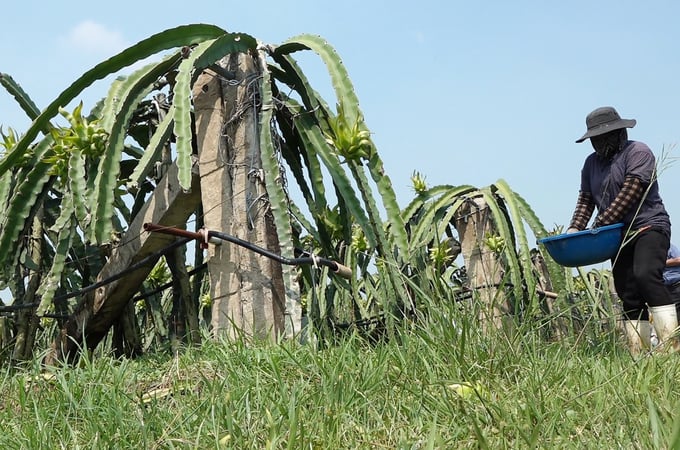
Many farmers in Long An province have applied microbial organic composting at home from agricultural by-products to fertilize crops. Photo: Phuc Lap.
According to the Department of Agriculture and Rural Development of Long An province, by the end of the third quarter of 2022, the total area of dragon fruit in the province reached 10,068 hectares, mainly in the districts of Chau Thanh, Tan Tru, Ben Luc and Tan An city, with harvested output is about 190,000 tons, down 55,000 tons over the same period.
Due to the impact of the Covid-19 epidemic, China implemented the "Zero Covid" policy, making it difficult to export dragon fruits to this market. The price of dragon fruit dropped sharply, not to mention the increase of input materials and fertilizers price, causing farmers to lose money. In some places, farmers have destroyed dragon fruit trees, mainly old gardens, with low yield and quality.
However, for cooperatives, farmers in Long An province who actively produce organic products are still purchased by traders stably. Since then, many growers have actively changed their production methods from traditional to organic. Notably, they also take advantage of agricultural by-products, including turning excess dragon fruit branches into organic fertilizer, reducing production costs and increasing income.
Faced with the need for fertilizer for the 3-hectare dragon fruit garden, for several years now, Mr. Vo Van Khanh in Ben Luc district, Long An province, has applied the method of composting agricultural by-products with biological products to make organic fertilizers.
According to Mr. Khanh, each year, each dragon fruit pillar removes 10-12kg of waste products such as branches, flowers, and rotten fruit. Each hectare of dragon fruit has about 1,200 - 1,300 pillars. Thus, annually, the total amount of waste products of dragon fruit discharged into the environment is approximately 12-15 tons/ha. With many waste products from dragon fruit trees, it will be a massive source of waste for the environment if you do not know how to take advantage of it.
The old dragon fruit branches, after being cut off, are gathered together, invested in a grinder to crush the bark, mixed and incubated with a biological product at the rate of 3 liters/ton, kept at moisture then composted for 3-4 days, mix well and set for another 5-7 days to produce a finished product that is a valuable source of organic fertilizer, and then fertilize it back for dragon fruit.
With this way of composting, people can quickly compost manure, and green manure at the household scale, eliminate the foul smell of waste and inhibit microorganisms that cause diseases for people, animals and plants. “The advantage of this method is that it can take advantage of many agricultural wastes and auxiliary materials such as rice husks, flat rice, cashew nut shells, rice straw, etc., to be processed into bio-organic fertilizers. In addition, applying organic fertilizer for dragon fruit trees helps keep the trees green, free from fungus, and delicious and sweet fruits.
The Ministry of Agriculture and Rural Development has set a target that by 2025, the percentage of organic fertilizer products allowed to be circulated will increase to 25% of the total number of fertilizer products; fertilizer production capacity of qualified production facilities will increase by 1.25 times, equivalent to 5 million tons/year.
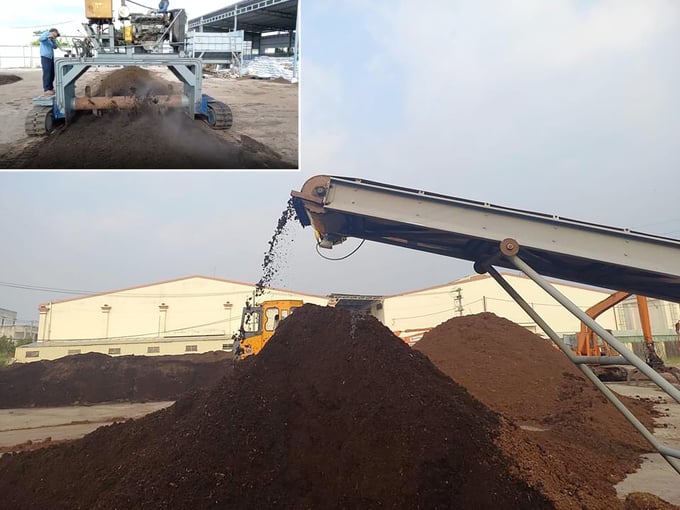
The process of crushing melaleuca bark to make organic fertilizer. Photo: Phuc Lap.
Mr. Thai Thanh Hoa (Long Thuong Commune, Can Giuoc District, Long An Province) - Deputy Director of Phuoc Dien Hi-Tech Cooperative is always concerned with how to make his products supplied to the market fresh, clean, and of high quality.
Mr. Hoa said thanks to the technical staff of the Agricultural Service Center of Long Thuong district, training and instructing on how to compost microbial organic fertilizers at home, he and his relatives in the cooperative knew how to take advantage of this source of manure in livestock to compost into microbial organic fertilizer, fertilize lush and safe crops without having to worry when fertilizer prices are high and scarce.
Since applying micro-organic composting at home, Mr. Hoa and other farmers save on fertilizer costs and take advantage of local agricultural by-products such as bat manure, goat manure, cow dung, straw…
Also a member of Phuoc Dien Hi-Tech Cooperative, Mr. Nguyen Tan Thanh (Tan Dien hamlet) cultivates in an area of 3,000m2, grows cinnamon, vegetables, and chives and only uses microbial organic fertilizers to compost in his own home to fertilize plants.
Every year, Mr. Thanh composts once to provide about 800kg of organic fertilizer, enough to fertilize three vegetables in the garden. For the composting to not affect the surrounding environment, Mr. Thanh invests in a cement tank. Each composting spreads a layer of goat manure and then waters a layer of urea and phosphate fertilizers. This operation is repeated until the cement tank is full.
The effective use of agricultural by-products not only brings high economic value to farmers but also helps solve environmental pollution, create clean agricultural products, and contribute to building a circular, green and sustainable agriculture for today and future generations.
Translated by Ha Phuc
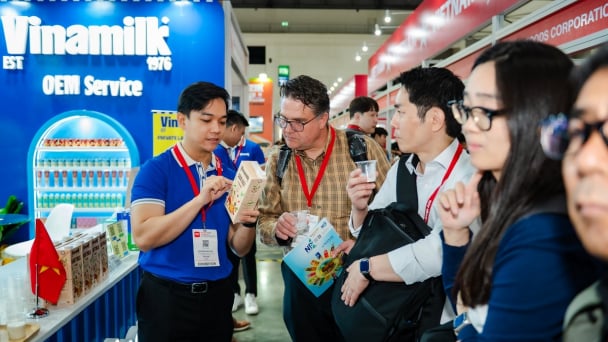
(VAN) At Thaifex Anuga Asia 2025, Asia’s leading food and beverage trade show, more than 170 Vietnamese enterprises are participating, with Vinamilk having been a consistent presence for nearly 20 years.
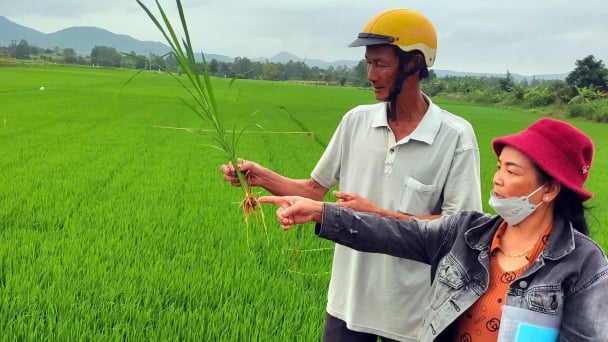
(VAN) On June 3, the Institute of Agricultural Environment organized a workshop titled 'Supporting greenhouse gas inventories in agriculture: Enhancing technical and governance insights for rice production in Vietnam'.
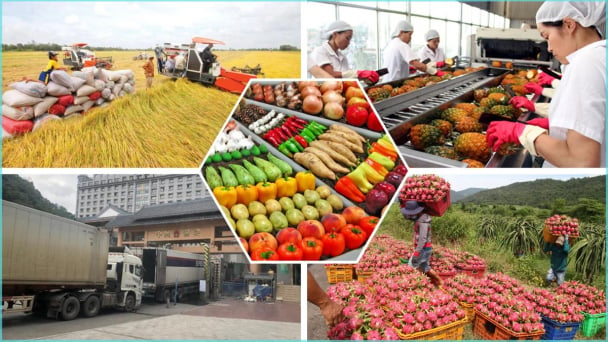
(VAN) In the first 5 months, the export turnover of agricultural, forestry, and fishery products rise significantly, thanks to a relatively stable domestic production and export market.

(VAN) Deposit Return System (DRS) created a natural cycle of responsibility, reinforced by social norms and practical necessity. Materials had value and returning them was second nature.

(VAN) According to the Norwegian Ambassador to Vietnam Hilde Solbakken, sorting waste at source and individual responsibility are key factors for sustainable waste management.
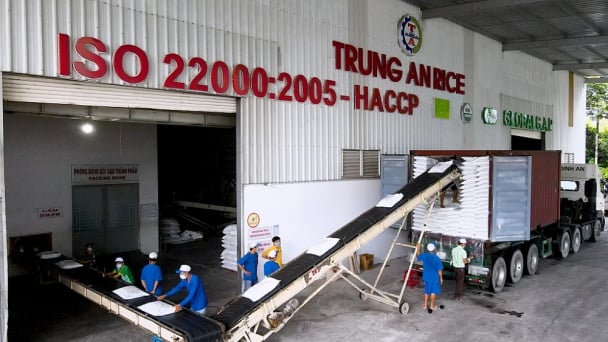
(VAN) On June 5, in Can Tho City, the Vietnam Rice Industry Association (VIETRISA) and Trung An Company will hold a ceremony to export the first shipment of 'Green and Low-Emission Vietnam Rice' to Japan.

(VAN) Minister Do Duc Duy believes this event will mark the start of a new chapter in deeper cooperation between Vietnam’s agricultural sector and the state of Iowa.